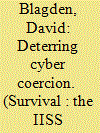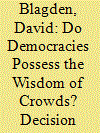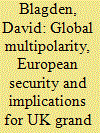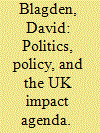|
|
|
Sort Order |
|
|
|
Items / Page
|
|
|
|
|
|
|
| Srl | Item |
| 1 |
ID:
178762


|
|
|
|
|
| Summary/Abstract |
Political realists disagree on what America should “do” and “be” in the Middle East. All are skeptical toward extravagant geopolitical projects to transform the region. Yet they differ over whether hegemony in the Gulf and its wider environs are worth the substantial investment of blood and treasure. Hegemonic “primacy realism” finds the commitment effective and affordable, and that Washington should stay to stabilize the region to ensure a favorable concentration of power. There is an alternative “shield of the republic” realism, however, which views the pursuit of armed supremacy in the Middle East as harming political order at home, reducing security more than generating it, and costing too much for too little gain. It involves interests that are either manageable from a remove or largely generated by being there in the first place. In this article, we lay out the latter position, arguing that the unruly Gulf is increasingly peripheral to US national interests. The region is losing its salience grand strategically, entanglement and continuous war damage republican liberties, and the calculus of whether continued hegemony is “worth it” has shifted decisively toward the downside. The time for abandonment has come.
|
|
|
|
|
|
|
|
|
|
|
|
|
|
|
|
| 2 |
ID:
170581


|
|
|
|
|
| Summary/Abstract |
Even an anonymous belligerent cannot avoid identifying its interests, which those seeking deterrence can then hold at risk.
|
|
|
|
|
|
|
|
|
|
|
|
|
|
|
|
| 3 |
ID:
170035


|
|
|
|
|
| Summary/Abstract |
What is it about democracies—if anything—that enables them to avoid war with each other while navigating conflictual international politics in pursuit of their own interests? Recent research in International Studies Quarterly by Brad LeVeck and Neil Narang (2017) provides an elegant new answer to this longstanding question. Drawing on “wisdom of crowds” logic—the insight that a large-enough group of inexpert judges is more likely to average towards an accurate estimate of a continuous variable than a smaller group, even when the smaller group contains relevant experts—supported by experimental evidence, they suggest that democracies’ strategic advantages lie in their large, diverse decision-making communities. If such crowd wisdom equips democracies to accurately assess others’ capabilities and intentions, so the argument goes, then they should be better than alternative regime types at maximizing their own interests while still avoiding the bargaining failure that is resort to war. Unfortunately, however, the politics of democratic foreign policy-making compromise the crowd-wisdom mechanism. This response article thus elucidates key flaws in the argument that crowd wisdom underpins democratic peace, before progressing to explain how the crowd-wisdom insight nonetheless carries important implications—irrespective of regime type—for strategic effectiveness.
|
|
|
|
|
|
|
|
|
|
|
|
|
|
|
|
| 4 |
ID:
159937


|
|
|
|
|
| Summary/Abstract |
Since 2010, quinquennial UK National Security Strategies – and the Strategic Defence and Security Reviews that follow – have been based on a public National Security Risk Assessment (NSRA). The purpose of the NSRA is to identify and prioritize UK security risks for the coming five-yearly cycle based on their likelihood and impact. This article recognizes that trading off severity against likelihood is a valuable strategic heuristic. Yet it concludes that until the NSRA can address nine key limitations, it will remain a flawed exercise. Such findings carry implications for UK policy, and for other states operating NSRA-style risk matrices.
|
|
|
|
|
|
|
|
|
|
|
|
|
|
|
|
| 5 |
ID:
138350


|
|
|
|
|
| Summary/Abstract |
The international system is returning to multipolarity—a situation of multiple Great Powers—drawing the post-Cold War ‘unipolar moment’ of comprehensive US political, economic and military dominance to an end. The rise of new Great Powers, namely the ‘BRICs’—Brazil, Russia, India, and most importantly, China—and the return of multipolarity at the global level in turn carries security implications for western Europe. While peaceful political relations within the European Union have attained a remarkable level of strategic, institutional and normative embeddedness, there are five factors associated with a return of Great Power competition in the wider world that may negatively impact on the western European strategic environment: the resurgence of an increasingly belligerent Russia; the erosion of the US military commitment to Europe; the risk of international military crises with the potential to embroil European states; the elevated incentive for states to acquire nuclear weapons; and the vulnerability of economically vital European sea lines and supply chains. These five factors must, in turn, be reflected in European states’ strategic behaviour. In particular, for the United Kingdom—one of western Europe's two principal military powers, and its only insular (offshore) power—the return of Great Power competition at the global level suggests that a return to offshore balancing would be a more appropriate choice than an ongoing commitment to direct military interventions of the kind that have characterized post-2001 British strategy.
|
|
|
|
|
|
|
|
|
|
|
|
|
|
|
|
| 6 |
ID:
146238


|
|
|
|
|
| Summary/Abstract |
International Relations (IR) scholarship represents the pursuit of theory about how the world works or ought to work. Yet despite this broad orientation of the field, the process of theory building itself remains challenging. There is abundant professional guidance on how to refine and test a theory once it has been created, but how do we get from a vague interest in some area of IR to a specific argument that explains or interprets a particular aspect of international politics? This article aims to refine the theorization challenge by taking stock of—and advancing—the debate over the relationship between inductive and deductive inference in IR theory building. It begins with an analysis of the short shrift still given to induction by many in the positivist IR community—a tendency that follows from the criticism of inductive theory building contained in Kenneth Waltz’s Theory of International Politics (1979) and its enduring legacy, despite Waltz’s own professedly nonpositivist approach—before progressing to consider the limits of a purely deductive approach to theorization. This article concludes that “creative-deductive” theory possesses key strengths, including its parsimonious and generalizable explanatory reach, and its truth-preserving quality. However, given the endogenous feedback relationship that exists between theoretical premises and empirical evidence, this article argues that it is only once we accept that induction is an intrinsic and unavoidable component of IR theory building that we can truly seek answers to the most important questions of international politics. Accordingly, IR scholars should strive to use the two in tandem as they set about developing new theory.
|
|
|
|
|
|
|
|
|
|
|
|
|
|
|
|
| 7 |
ID:
164642


|
|
|
|
|
| Summary/Abstract |
The “Impact Agenda” of the UK Research Excellence Framework has major implications for the relationship of international relations scholars, and social scientists more generally, to government policymaking—not just in Britain, but around the world. This article demonstrates that, at its worst, the Impact Agenda may struggle to capture the true contribution of scholarship to the public good, incentivize sub-optimal forms and modes of research, erode academics’ property rights, see atomized academics exploited or harmed by powerful institutions, and jeopardize scholars’ intellectual integrity and independence. The article also suggests, however, that these vulnerabilities can be managed by the resolution of certain key questions pertaining to scholarly conscience and expectations of reward prior to pursuing “Impact.” Given that the pursuit of international peace and societal progress through teaching and research is the reason many of us choose to become professional international relations scholars, the article concludes with some reflective “tips” for achieving policy influence from early in an academic career.
|
|
|
|
|
|
|
|
|
|
|
|
|
|
|
|
| 8 |
ID:
167456


|
|
|
|
|
| Summary/Abstract |
What do UK policymakers mean when they say that Britain’s strategic environment is returning to “multipolarity”? In realist international theory, polarity is a specific causal concept; the number of powers capable of balancing even the most capable other state(s) in the international system (“poles”) is taken to determine the system’s stability. Does the post-2017 appearance of polarity references in British security policy documents therefore reflect some unexpected UK renaissance of realist thought? Or is something else going on, as recent work by Ben Zala suggests? This article will demonstrate that, while UK official usage of the “multip–” word has indeed flourished recently, the term is actually being used in a more elastic, less bounded way than realism prescribes in order to generate other kinds of political effect. Specifically, “polarity” (and its “multi-” prefix) is used to characterise the behaviour of those major states that oppose Western-preferred international order, to elide Britain’s own relative power/status tensions, and to capture an expansive laundry-list of perceived international dangers. The article then discusses five ways in which a shift in polarity could negatively affect Britain; important consequences that merit preparatory contemplation, yet that an imprecise, catch-all understanding of “multipolarity” too readily obscures.
|
|
|
|
|
|
|
|
|
|
|
|
|
|
|
|
| 9 |
ID:
132098


|
|
|
|
|
| Publication |
2014.
|
| Summary/Abstract |
While it is a truism that British security and prosperity have their foundation in maritime power, this has not translated into a conceptualisation of sea power that can be of practical use to policy-makers and practitioners. David Blagden applies two crucial concepts in security studies to the UK's contemporary situation and argues that a maritime grand strategy based on offshore balancing will serve the country well in the future.
|
|
|
|
|
|
|
|
|
|
|
|
|
|
|
|
| 10 |
ID:
182643


|
|
|
|
|
| Summary/Abstract |
What are the potential deterrence advantages for new states seeking to acquire long-range conventional precision strike (LRCPS)? Using the case of Poland, this article argues that such LRCPS proliferation offers two possible deterrent benefits. First, LRCPS strengthens its possessors’ ability to threaten aggressors with costs in the form of both counterforce denial and countervalue punishment, thereby reducing dependence on great-power allies’ extended-deterrence commitments. Second, it provides a new center of retaliatory decision proximate to the threat, thereby strengthening the credibility of great-power allies’ extended-deterrence commitments. However, while LRCPS capabilities may indeed bring certain advantages, they may also exacerbate political hostilities, incentivize escalation, and lack the survivability and penetrability needed to generate the envisioned deterrence effects. Thus, the overall consequences of such proliferation for strategic stability and associated international security are ambiguous, meriting a case-by-case analysis. If LRCPS is pursued nonetheless, meanwhile, then a countervailing combination of operational and strategic measures may be employed to reduce both first-strike temptations and adversaries’ broader fears.
|
|
|
|
|
|
|
|
|
|
|
|
|
|
|
|
| 11 |
ID:
093243


|
|
|
|
|
| Publication |
2009.
|
| Summary/Abstract |
In this year's Trench Gascoigne Essay Prize winning essay, David Blagden assesses the fundamental assumptions underlying opposition to the retention of major war-fighting capability within the UK armed forces, arguing that the case has not been made for a solely counter-insurgency-based future. Despite the prospect of far-reaching budgetary cuts, Britain needs to retain a balanced range of capabilities in order to hedge against an array of possible future threats.
|
|
|
|
|
|
|
|
|
|
|
|
|
|
|
|
| 12 |
ID:
168590


|
|
|
|
|
| Summary/Abstract |
How do states’ desires to perform an international-societal role interact with the imperative to safeguard their security in an anarchic international system? Using the case of the contemporary United Kingdom, this article explores the tensions between roleplay and realpolitik—gaining social recognition as a particular kind of state while doing what it takes to survive—through one key role conception, “Great Power.” Recent scholarship has dubbed Britain a “residual Great Power”: lacking the wherewithal to impose regional order through preponderance, it is still cast into the role of militarized international order-upholder by the allies whose support is necessary for such role-sustainment, America and France. Yet this role-based approach sets a different threshold on capability than the requirement to undertake survival-essential military missions, independent of potentially unreliable allies’ charity—realists’ understanding of “great power.” Theoretically, therefore, the article demonstrates that roleplay and realpolitik remain separate incentive structures underlying states’ foreign policy choices. Empirically, meanwhile, the article shows—through opportunity-cost force-posture analysis—that contemporary Britain is torn between the logics. Striving for independent self-protection capabilities, above-and-beyond the “residual power” criterion, London nonetheless makes a residual power's implicit assumptions about alliance support in the deployment of those capabilities.
|
|
|
|
|
|
|
|
|
|
|
|
|
|
|
|
| 13 |
ID:
179044


|
|
|
|
|
| Summary/Abstract |
Leon Trotsky’s notion of ‘uneven and combined development’ (UCD) has been gaining traction as an explanatory theory of international relations over the past decade, notably in work by Justin Rosenberg and Alexander Anievas. The idea that the uneven sequencing of economic development between countries affects both their relative power relationships and domestic political stability, in particular, carries prima-facie intuitive plausibility. The potential consequences for international stability of such relative power shifts and domestic upheavals suggest, furthermore, that there may be significant explanatory payoffs from this line of investigation. At the same time, however, the UCD intuition raises other questions about causal foundations and theoretical affiliations. What accounts for the sequencing of uneven development, for example? And how exactly do both relative power shifts and domestic political instability elevate war risks? This paper will address these lacunae, by demonstrating that – at the level of its underlying micro-foundations – UCD can be understood as a compound of catch-up convergence growth theory and security-dilemma realism. Such a recognition paves the way, in turn, for a fruitful application of UCD to contemporary questions in international politics.
|
|
|
|
|
|
|
|
|
|
|
|
|
|
|
|
|
|
|
|
|